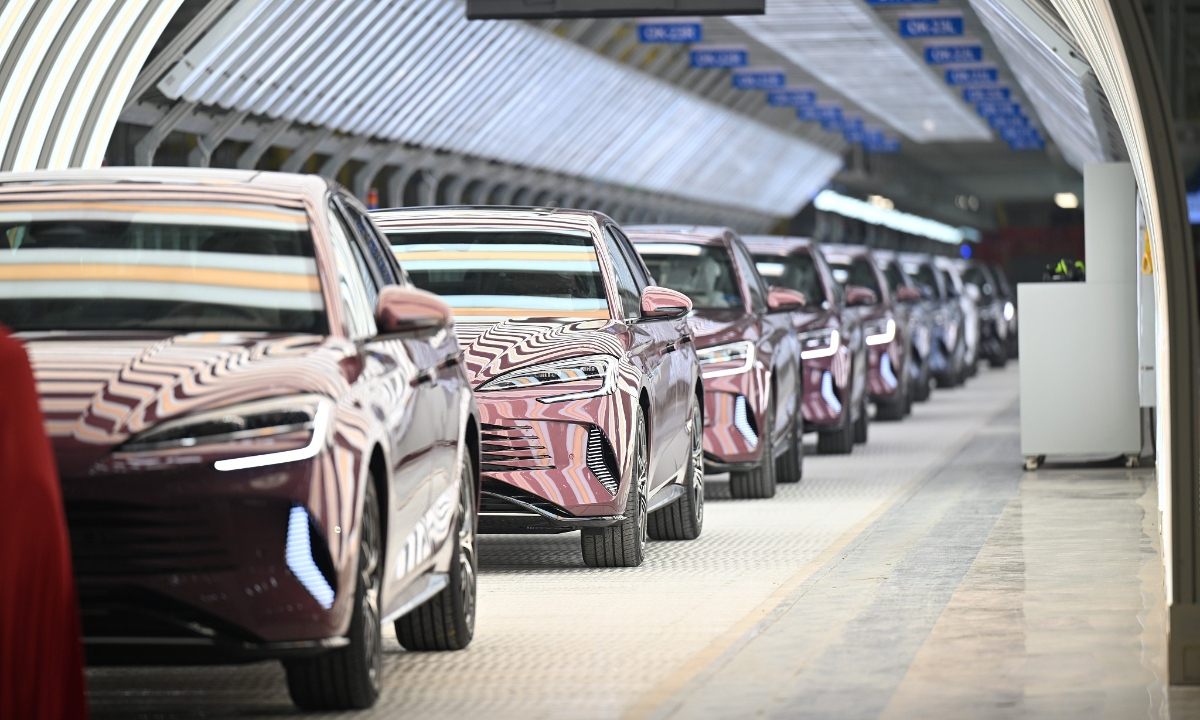
EV Photo:VCG
Several Chinese government departments on Tuesday blasted Canada's announcement of additional tariffs and other restrictive measures against Chinese products, including electric vehicles (EVs), saying Canada's move is typical protectionism and urged Ottawa to immediately correct the wrong practices.
Chinese officials and experts also slammed Canada for blindly following certain countries in imposing the tariffs and warned that the typical trade protectionist actions will seriously impact the bilateral trade relationship, and hurt the interests of companies from both countries.
While Canada's tariffs will have limited direct impact due to the relatively small trade volume in affected products, the move further complicates bilateral ties that have only been improving recently and increases uncertainty for Chinese companies to operate in the Canadian market, experts noted.
In a press release on Monday, Canada's Department of Finance announced several measures that it claims to "protect Canadian workers and key economic sectors from unfair Chinese trade practices." Among the measures is a 100 percent additional tariff on Chinese-made EVs effective October 1, 2024. It also plans to impose an additional tariff of 25 percent on imports of steel and aluminum products from China, effective October 15, 2024.
The move immediately drew harsh criticism from several Chinese government departments. In a statement on Tuesday, the Chinese Ministry of Commerce (MOFCOM) expressed strong dissatisfaction and firm opposition to Canada's measures. "Canada claims to support free trade and the multilateral trading system based on WTO rules, but it blatantly violates WTO rules, blindly follows certain countries, and announces that it will adopt unilateral tariff increases. This is a typical example of trade protectionism," the MOFCOM said.
Canada's announcement came after the US also announced additional tariffs on Chinese EVs and other products, a move which is facing increasing criticism from both China and US domestic industries amid concerns over mounting costs. It also came after the EU announced hefty additional provisional tariffs on Chinese EVs.
On Tuesday, Lin Jian, a spokesperson for the Chinese Foreign Ministry, said that "China urges Canada to respect facts, observe WTO rules, correct this wrong decision at once, and stop politicizing trade issues. China will take all measures necessary to safeguard the legitimate rights and interests of Chinese enterprises."
Lasting damageChinese experts said Canada's protectionist actions are primarily aimed at showing loyalty to the US and are not in the interest of Canada, especially in terms of its green transition.
"It seems that the Canadian government has not figured out which is more important for Canada - its national interests or its identity as a US ally," Liu Dan, a research fellow at the Center for Regional Country Studies at Guangdong University of Foreign Studies, told the Global Times, adding that there is no need for Canada to sacrifice normal economic exchanges with China for the sake of Washington's strategic selfishness.
While Canada's actions were reportedly aimed at Chinese EV makers, the volume of Chinese EV exports to Canada were relatively small until Tesla started to ship its Shanghai-made EVs to Canada in 2023. The value of Chinese EV exports to Canada rose to C$2.2 billion ($1.6 billion) in 2023, compared to C$100 million in 2022, according to media reports.
The value of Chinese EV exports to Canada is relatively small, compared to 9 billion euros ($9.7 billion) worth of Chinese EVs exported to the EU during the 12 months ending in April, according to media reports. Notably, some major Chinese EV makers have not even started selling passenger EVs in Canada. For example, BYD, one of the largest Chinese EV makers, just filed a regulatory document in July, as it seeks to enter the Canadian market, Reuters reported.
Still, as is the case in the US' tariffs against Chinese products, Canadian companies and consumers will bear the additional costs, experts said.
"It is unwise for Canada to blindly follow US' footstep in imposing tariffs on Chinese EVs," Zhou Mi, a senior research fellow at the Chinese Academy of International Trade and Economic Cooperation, told the Global Times on Tuesday.
Like what took place after the US hiked tariffs on Chinese imports over the past several years, additional tariffs will directly increase the costs for Canadian consumers and enterprises if importers choose to import high-quality and price-competitive Chinese products, Zhou said.




